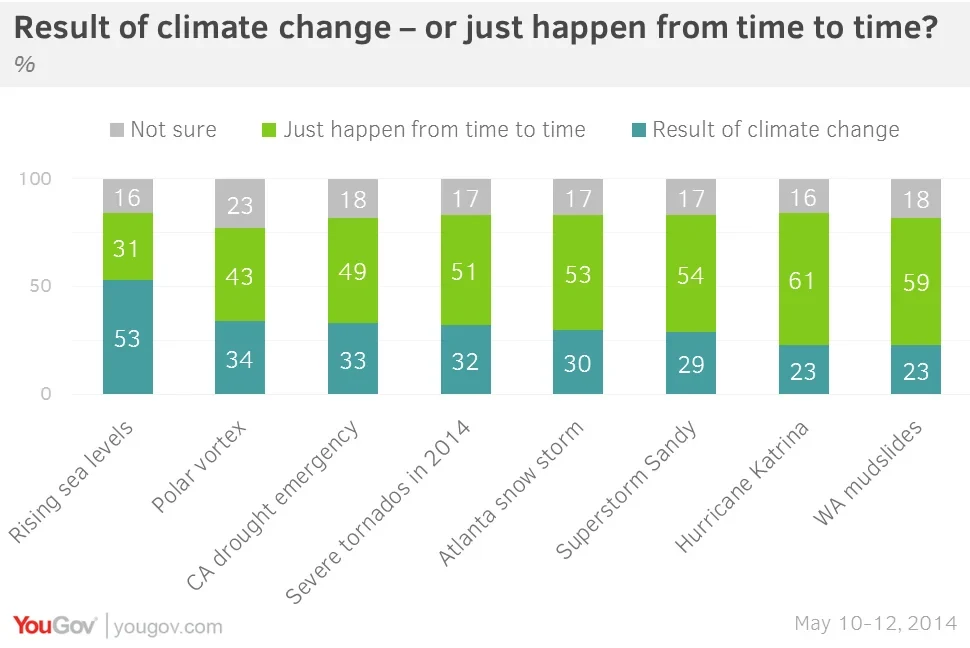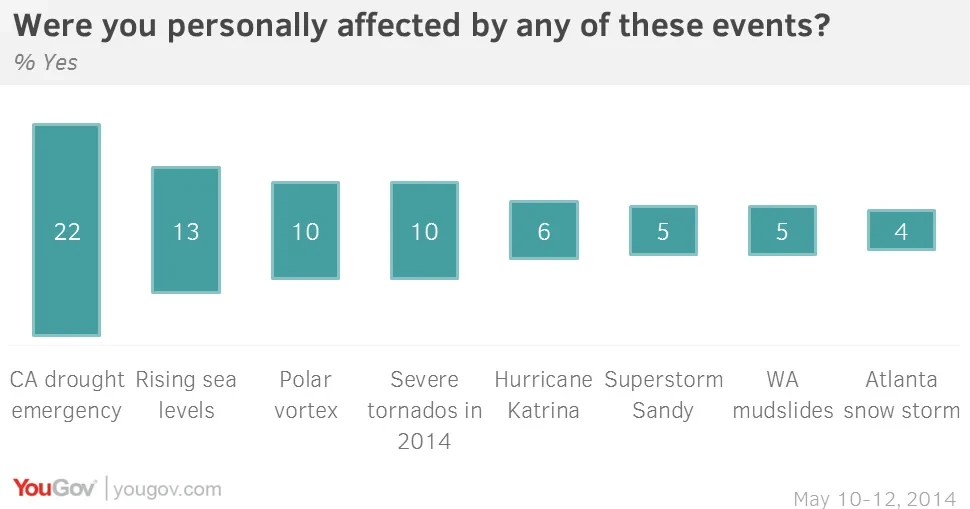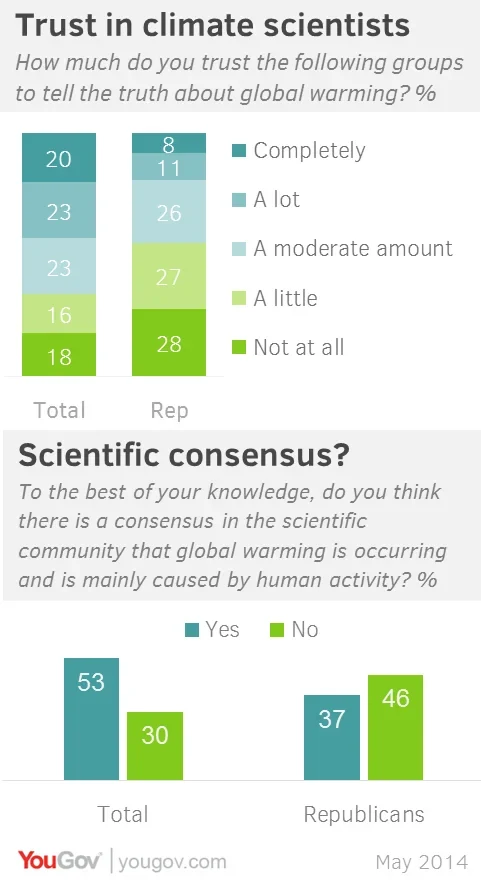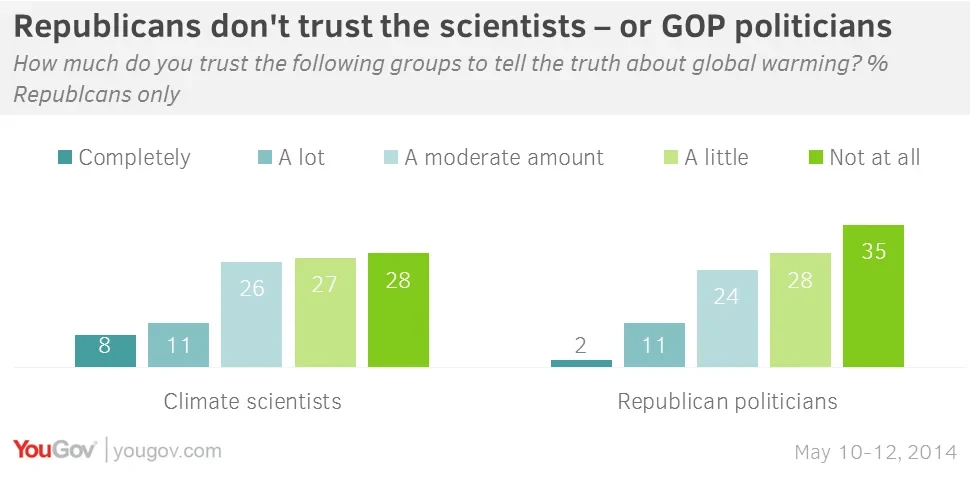Rising sea levels may convince Americans that climate change is real, but Republicans in particular are distrustful of people – even GOP politicians – speaking about climate change
Last week’s climate change assessment focused on rising sea levels: they have risen in the last century and they will continue to rise. The report may have helped convince Americans that there is something happening to sea levels and that it might be due to climate change. Unlike weather events like Superstorm Sandy, last winter’s polar vortex, and the Western drought, which most of the public in the latest Economist/YouGov Poll aren’t convinced climate change had anything to do with, most Americans believe that climate change is the cause of rising sea levels. 53% say that, compared with a third or less who believe climate change has caused other weather changes.

Most say those activities are just part of cyclical weather happenings.
But even belief in climate change as a cause of rising sea levels isn’t universal. Most Republicans, who for the most part are climate change skeptics, don’t believe that rising sea levels are the result of climate change, but instead is something that happens “from time to time.” Just one in four Republicans describe rising sea levels as due to climate change.
In fact, most Republicans don’t think weather events have affected them personally. Just 37% do, compared with 46% of the population overall. 17% of Republicans say they were affected by this winter’s polar vortex, larger than the percentage of Republicans who cite any other weather event. However, only 16% of Republicans said the polar vortex was the result of climate change, half the percentage who felt that way nationally.

In fact, the polar vortex was the most dramatic event, affecting the largest number of people. It was felt by 22% nationwide, and was the most frequently-cited event in the South and the Midwest. 37% in the Midwest said they had been affected by the polar vortex. In the West, nearly one in three have been personally affected by the drought. 41% in the Northeast were impacted by Superstorm Sandy; 27% point to the polar vortex. In the South, nearly one in five report personal experience with Hurricane Katrina.
Rising sea levels have yet to affect most in the public – only 5% say have been personally affected by that as of now. Those who have been impacted are much more likely to live in the Northeast, where Superstorm Sandy and other weather events have eroded some beach areas.

The scientists who have focused on climate change are more believable than are politicians, government officials or businesspeople. Two-thirds of the public trust climate scientists at least moderately when it comes to telling the truth about climate change. And by 53% to 30%, Americans agree there is consensus in the scientific community that global warming is occurring and is mostly cause by human activity. But on both these questions, Republicans take a different view. Less than half of Republicans trust climate scientists even a moderate amount. And Republicans are more likely to think there is no scientific consensus.
No other group has much credibility on the issue – politicians, the military, government officials, or oil and gas company executives. Even though most Republicans have little trust in the words of climate scientists, they have more trust in them than they do in their own party’s political leaders.
Even though about half of Republicans say climate change is not very serious, and nearly twice as many credit natural causes as say human activities are to blame for any climate issues, there are as many Republicans willing to take action as not. A majority of the public overall thinks the world’s most developed countries have a greater responsibility to control greenhouse gases and other pollutants than less developed countries do. 43% of Republicans also say this. Republicans also divide when asked if the United States, as the world’s leading industrial country, has a responsibility to take action even at a possible cost to American competitiveness.

More than half (53%) of the public also say developed countries have a responsibility to help poorer countries with the effects of climate change. Republicans divide on this as well.
But can governments do anything? Maybe. 50% say governments can take action to slow the effects of climate change. And a third of the otherwise skeptical Republicans agree.
But this particular U.S. government may have a way to go. Only a third approve of the way President Obama is handling climate change.
Just as many (43%) approve of the President’s handling of the environment as disapprove.
Image: Getty
Full results can be found here.
Economist/YouGov poll archives can be found here.









